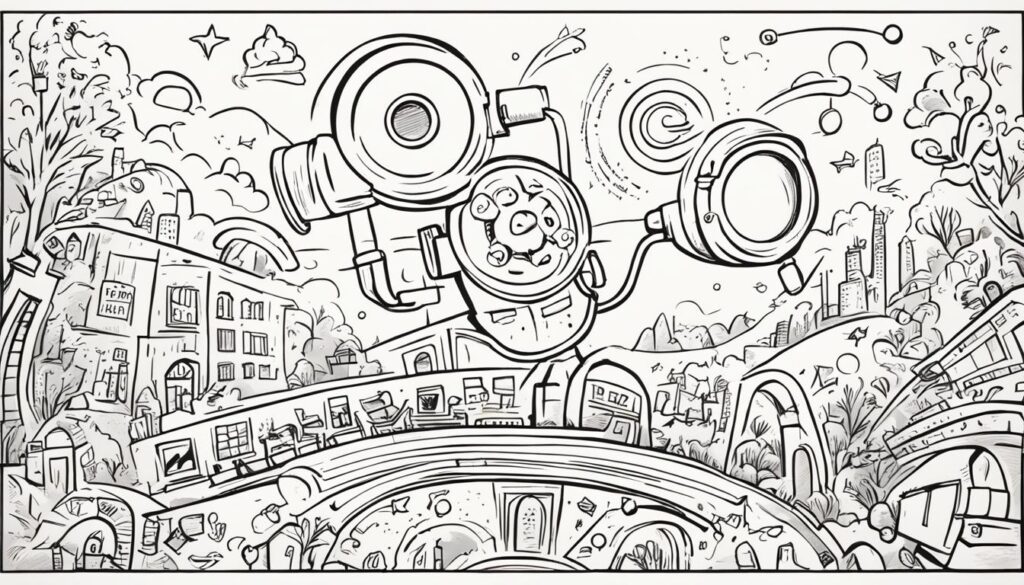Curiosity rests within us, like a sleeping giant. It’s a key to a world brimming with endless discoveries. When we awaken this giant, we unlock the powers to transform our lives greatly.
Remember when curiosity took you on an adventure? It could have been an intriguing article, a thrilling book, or a deep conversation. In those moments, excitement, wonder, and a thirst for knowledge filled you.
But curiosity isn’t just about learning. It also shapes how we connect with others and grow personally. It feeds empathy, allowing us to see the world from others’ eyes and form deep bonds.
Studies suggest curiosity boosts trust and influence when we interact with others. Showing genuine interest helps in forging stronger relationships and creating a sense of belonging.
Brian Grazer’s book, “A Curious Mind: The Secret to a Bigger Life,” highlights curiosity’s transformative impact. His conversations with influential people have enriched his work in Hollywood and beyond.
Grazer shows us how curiosity fuels all life aspects, from work to creativity and friendships. It pushes us to ask tough questions, challenge the usual, and find new solutions.
Let’s start exploring the hidden powers of curiosity together. We’ll see how it benefits learning, innovation, and problem-solving. It also boosts communication, leadership, and personal growth.
Key Takeaways:
- Curiosity transforms our lives by sparking a desire to learn and grow.
- It enhances empathy, trust, and relationship-building.
- “A Curious Mind” by Brian Grazer uncovers the potential of curiosity.
- Curiosity propels innovation, problem-solving, and effective communication.
- A curious mindset reveals our hidden capabilities and opens up new paths.
References:
- 1“The Hunger Habit: Why We Eat When We’re Not Hungry and How to Stop” by Judson Brewer
- 2“A Curious Mind” by Brian Grazer
- 3“Curious Mind: the Secret to a Bigger Life” by Charles Fishman and Brian Grazer
The Rewards of Curiosity: Empathy, Trust, and Influence
Curiosity isn’t just about coming up with new ideas. It helps us in many areas of our lives. By being curious, we learn to understand and feel for others, trust more, and become influencers.
Empathy: When we’re curious, we strive to get the perspective of others. This lets us connect with them truly. It leads to stronger and more significant bonds, both in personal and work life. Research suggests that empathy aids in teamwork and makes us happier4.
Trust: Curiosity is key to building trust. When we honestly want to know others’ thoughts, it creates a trusting space. Building trust is essential for any productive teamwork or communication. Curiosity lays the groundwork for trust in our work and communities5.
Influence: To be leaders and change-makers, curiosity is vital. It moves us to seek knowledge, doubt the usual, and spark fresh thinking in others. It gives us the insights to make better decisions and positively affect people’s lives. Curiosity helps us inspire and lead meaningful change5.
Curiosity isn’t just for us individually. When everyone in a place of work gets curious, a culture of learning and creativity blooms. It’s where new ideas start, team members work well together, and trust grows. This environment leads to innovation and amazing achievements.
But curiosity’s benefits reach even wider. It’s crucial for tackling big problems in society and pushing forward in many fields. Take artificial intelligence (AI), for instance. Curiosity is what allows us to understand its potential and make sure it helps rather than harms humanity. It makes us consider the ethical sides and societal effects of AI5.
In summary, curiosity opens up a world full of rewards. It teaches us to empathize, build trust, and influence others positively. It makes our personal lives, professional tasks, and societal efforts richer and drives us towards a future filled with empathy, trust, and leadership.
Curiosity and Learning: Knowledge as a Source of Unexpected Dividends
Exploring different areas of life fills you with surprises and benefits. Growing your knowledge makes you understand the world better. This opens up new chances and connections.
Wanting to know more leads you on an exciting journey. It helps you see more, solve problems, and think outside the box. You’ll find new ways to face challenges and grab opportunities.
Curiosity pushes you to ask big questions and discover new things. Seeking answers helps you grow and see the world differently. Knowledge lights the way to finding out who you are.
6 Studies show curiosity matters a lot in marketing. It gets people interested and drives their actions. Marketers use curiosity to connect with people and keep them coming back.
7 In law, being curious and always learning is key to doing well. With new tech changes, lawyers need creativity and smarts to stay ahead. Working with machines and new technologies is now a big part of the job.
Being curious makes you better at thinking and solving problems in law. It helps you learn new skills and be better for your clients. Staying updated with learning keeps you leading in your field.
8 A 1920 essay talks about the issue of believing one race is better. It says this belief causes harm and slows progress by fostering hate. The essay urges us to value honesty and equality instead.
Curiosity and learning help us grow and connect with others. They let us understand different views and break down prejudices. This makes our relationships deeper and builds trust.
Curiosity is the first step to knowing more, and every bit you learn adds up. It helps you make better choices, leading you to success. Embrace your curiosity and keep learning to discover new rewards.
Curiosity and Innovation: Asking Provocative Questions
Innovation starts by asking tough questions that shake things up9. These questions make us think outside the box and look for new answers. Being curious leads to innovation, making us dig deeper and find unique solutions.
To ask these hard questions, you need patience and a willingness to learn9. It’s all about getting to the heart of the problem, ignoring what you assume, and searching for surprises. Embracing curiosity lets us challenge ourselves, sparking creativity and bringing positive changes.
Curiosity plays a huge role in creating innovative places10. In 2018, San Francisco talked about an “innovation petting zoo”10. This showed how important it is to have a workspace that loves new ideas, change, and learning from mistakes10. Companies remodeling their offices for innovation show they value a curious spirit10.
Diversity in teams is key for innovation10. Bringing in different people introduces new ideas and experiences10. Being innovative means balancing order and the freedom to explore10. Putting innovation into a company’s core is tough but achievable10. The roles of those in charge of innovation change a lot, showing how dynamic this process is10.
Imagination is crucial for innovation10. Thinking big, and questioning the “What if?” and “Why?” opens up new possibilities10. Innovation isn’t just about tech; it’s about changing how we think, accepting failure, and thinking critically10. A podcast talked about how thinking differently is key to new ideas10.
Being curious is a big deal when it comes to innovation and moving forward11. Places that aim for progress value curiosity a lot11. Curiosity comes from wanting to know more than you do11. When parents answer their kids’ questions and encourage curiosity, they’re helping them become more inquisitive11.
Talking with others not in your field can spark new ideas11. Keeping curiosity alive is important, as people like Einstein and Disney showed us11. Einstein said curiosity is vital for learning11. Disney believed curiosity led to his company’s success, by always looking for new opportunities11.
In conclusion, curiosity and innovation are closely linked. Asking tough questions and promoting a culture of curiosity are central to breaking new ground. By valuing curiosity, bringing diverse views together, and fostering imagination, companies can foster a climate that champions innovation and drives big changes.
Curiosity and Problem-Solving: Eliminating Assumptions and Barriers
Curiosity is key in problem-solving. It makes us question things and break down barriers12.
We often rush to solve problems. But curiosity tells us to look at different angles first12.
It lets us see new solutions by challenging what we usually assume. This way, we find fresh and effective approaches12.
Curiosity helps us overcome obstacles in our minds and emotions. It encourages us to think without limits12.
It also means we’re open to feedback and different viewpoints. This builds a space where everyone learns and grows together12.
Curiosity pushes us to understand problems fully, not just put quick fixes. Knowing the real issue leads to better solutions12.
Studies show curiosity sparks creativity and innovation. By removing limits, it opens up new, creative ways to solve problems. This leads to unique and impactful solutions1213.
So, face problems with curiosity. Ask questions, remove obstacles, and be open to new ideas. With curiosity, you’ll discover solutions you hadn’t thought of before1213.

The Importance of Listening: Curiosity and Communication
Communication is more than just talking about ourselves. It’s also listening to what others say. Being curious makes us tune in to people and what’s happening around us. By wanting to learn from others, we make stronger connections and get better at talking and listening.
Curiosity opens our minds and hearts. This lets us learn important stuff from others. Embracing curiosity helps us understand the world better and improves our relationships.

Listening is key to talking well with others. It shows we respect and care about them. We get to understand the words, feelings, gestures, and hidden messages people share. A study showed that 65% of how we talk isn’t using words14. This highlights why we should notice body language and other silent signals.
Active listening means we really focus on the person talking. Keeping eye contact 50% to 70% of the time is recommended14. It helps keep the conversation comfortable. Active listening and being curious build trust and help us understand each other better.
Asking open-ended questions is a smart way to show you’re curious when listening actively. Such questions need more than yes or no answers1415. They make the person talking share more about their thoughts and feelings. This leads to stronger bonds and a fuller understanding.
Using active listening skills, like paraphrasing, helps us reflect on what was said14. It’s about making sure we got the message right. This avoids misunderstandings and shows we’re paying attention.
Staying neutral and not judging when listening is crucial14. It makes the person talking feel safe to open up. When we’re curious and ready to understand, our chats become spaces where everyone feels valued.
Active listening is great for both personal and work relationships. It brings empathy, understanding, and support14. Listening well helps us avoid mix-ups and grow closer to others.
| Benefits of Active Listening | References |
|---|---|
| Fosters empathy and understanding | 14 |
| Builds trust and strengthens relationships | 14 |
| Avoids miscommunication and misunderstandings | 14 |
In summary, being curious and listening well are crucial for good communication. By truly caring about what others say, noticing how they feel and act, and engaging in meaningful talks, we better understand each other. Through curiosity and communication, we connect with others and navigate life’s complexities.
The Value of Acting on Curiosity: Reflection and Action
Acting on curiosity opens the door to personal growth and fulfillment. It lets us apply what we’ve learned. This way, we can grow and understand ourselves and the world better.
By looking back at our explorations, we see patterns in our behavior. This helps us know our strengths and weaknesses. We can then make choices that match our values and dreams.>
Curiosity drives us to explore new knowledge and challenge old ideas. Reflecting on our findings broadens our view. It makes our understanding of the world richer.
This deeper thinking shows us the importance of staying curious and involved. It highlights the value of seeking more knowledge.
Reflection links curiosity and action. When we ponder our discoveries, we find the drive to do more. Crafting and following plans based on our insights turns curiosity into action.
Curiosity can change our lives and positively affect those around us. By following our interests, we find hidden skills and grow. Taking action helps us achieve goals and make a difference.
Curiosity isn’t just about thinking; it’s a drive towards learning and improving. It moves us to keep on discovering new things.
Brian Grazer shows us that curiosity’s value is in the questions and the steps we take afterwards16. By staying curious, reflecting, and acting, we reach our greatest potential. This creates a life filled with purpose, growth, and joy.
Curiosity and Leadership: Fostering a Curious Culture
Creating a culture of curiosity takes effort, planning, and daily focus. It brings big rewards for leaders and their teams. A curious culture fuels innovation, growth, and adaptability both personally and at work.
Leaders are key in building this environment. They ensure teams feel safe to ask questions and chase new insights. This way, employees can explore without fear of making mistakes.
Curiosity is identified as a key leadership requirement17.
Curious leaders think deeply and pose smart questions. They guide their teams towards new and creative solutions. Companies that value curiosity spark creativity and innovation throughout the workplace.
Leaders often say their company backs curiosity more than their staff might think18. In 3 years, an employee’s curiosity can wane18. Mid-level managers feel less positive about curiosity than team leads or senior execs do18.
Curiosity isn’t just for sparking new ideas. It also sharpens decision-making. Through it, leaders and teams consider different viewpoints, question the status quo, and make smarter decisions.
Curiosity matters greatly for innovation, especially in complex businesses17. Creative and innovative fields especially appreciate curious minds19. It lays the foundation where creativity blooms.
A curious culture urges everyone to keep learning and embrace change. It promotes a growth mindset, pushing both personal and team development.
Some companies make curiosity a core value18. They see it as what sets top achievers apart from the rest18.
Supporting a curious culture means offering resources like training and mentorship. It’s about making a workspace where trying new things and working together is encouraged.
Curiosity is called the seedbed of creativity19. Industries that gain from increased awareness and innovation stress the need for curiosity-led leadership19.
By valuing curiosity, businesses can unlock their greatest potential, embrace change, and stay competitive. Leaders who champion curiosity not only fuel innovation but also motivate their teams to achieve great things.
Curiosity and Personal Growth: Recognizing What Truly Matters
Curiosity makes us want to learn more and helps us grow. It leads us to find out what’s really important in our lives. This drive for knowledge helps us learn more about ourselves.
Our genes and where we grow up influence how curious we are20. But, it’s our desire to learn that keeps our curiosity alive20. Curiosity means always learning, helped by our brain’s ability to change and make new connections20. This ability to change is powered by our genes that help our brains grow20.
Curiosity turns on parts of the brain that make us want to learn because it feels good20. Our curiosity to know more stays with us as we get older, even if we’re less surprised by new things20. Dopamine, a brain chemical, makes us seek out new things because it feels rewarding20. But too much dopamine can make us act without thinking or develop bad habits20.
When we focus on what interests us, we can figure out what’s really meaningful20. This lets us choose paths that make us happy and help us grow. It guides our decisions towards what fulfills us20.
Exploring the different sides of curiosity, like finding joy in discovery and craving new experiences, shows its value to our well-being21. Being curious makes us happier, less anxious, and more content21. It drives progress, creativity, and innovation in our lives and the world21. Curiosity helps us make better decisions, understand our emotions better, and stay motivated21. It also makes us concentrate harder, learn more deeply, and stick with our goals21. Plus, wanting to know more about others can make us more understanding and empathetic21.
Curiosity helps us connect with others, communicate better, solve problems, and handle uncertainty well21. Using curiosity in therapy gets us ready to learn and enjoy the journey itself21. It raises our emotional awareness, helps us get along with others, and learn useful skills21. Curiosity also gives us strength, hope, and inspiration when times are tough21.
Pairing curiosity with a growth mindset creates the perfect setting for flow, where we feel fully engaged and happy22. Studies have shown that a growth mindset helps us learn new skills through effort and determination22. Curiosity boosts our mood and psychological well-being, reducing fear and encouraging exploration22. Flow happens when our skills and a task’s challenge level are in balance22. By adopting a growth mindset and focusing on learning, we can enjoy our tasks more and worry less about making mistakes22.

| Benefits of Curiosity and Personal Growth202122 | |
|---|---|
| – Shaping individual differences in curiosity | |
| – Fueled by a burning passion for exploration and knowledge | |
| – Brain’s ability to adapt and create new neural pathways | |
| – Activation of genes supporting lifelong learning | |
| – Triggers brain regions associated with primal needs and rewards | |
| – Constant presence of epistemic curiosity throughout life | |
| – Role of dopamine in modulating curiosity and novelty-seeking | |
| – Link between curiosity and positive emotions | |
| – Value of curiosity in decision-making and emotional intelligence | |
| – Persistence in achieving goals and deeper learning | |
| – Broadening perspectives and developing empathy through social curiosity | |
| – Connection, communication, conflict resolution, and tolerance of uncertainty | |
| – Facilitating brain priming for learning | |
| – Enhancing emotional awareness, interpersonal development, and adaptive skill building | |
| – Resilience, hope, inspiration, and seeking solutions through curiosity | |
| – Alignment of curiosity, growth mindset, and flow for optimal experiences |
The Journey of Curiosity: Energy, Planning, and Attention
Curiosity is not just about sitting and wondering. It’s an active adventure that takes energy, careful planning, and steady attention. As we start this journey, we discover hidden talents, explore new ways, and make special connections.
To begin, we need to put in our energy. It requires a strong will to dive deep into learning23.The book “The Hidden Powers of a Curious Mind” tells us that in 1974, curiosity opened new doors. By spending our energy on being curious, we grow and discover constantly.
But, energy is not all we need. A good plan is also key to keeping curiosity alive. We must make time for new experiences, like reading or attending talks. This helps us keep our curiosity a priority, even when we’re busy.
“Curiosity is the spark in learning and the source of creativity.”
Staying focused is essential as we get curious. Paying attention to our thoughts and what we see around us is crucial. It makes our journey rich and helps us connect deeply with the world. Listening well in conversations24 can lead us to amazing discoveries.
With energy, planning, and attention, our curiosity journey becomes more than just interest. It grows into a path for personal improvement, career success, and deeper world understanding. It’s hard work, but the rewards are beyond measure.

People like Brian Grazer have shown us, in “A Curious Mind”25, how curiosity fuels energy and ideas. This power lets us meet life’s challenges and grow personally and professionally. Curiosity pushes us beyond usual limits and leads to innovation, better relationships, and unlocking our fullest potential.
Keep fueling your curiosity as you walk your path. Spend your energy wisely, make plans to explore, and never stop paying attention. Let curiosity be the force that drives you to places full of new chances and discoveries.
Conclusion
Curiosity drives us to explore and grow. It helps us innovate and communicate better. Brian Grazer, a big name in entertainment for over four decades26, talks about this in “A Curious Mind”26. His book shows how meeting new people fueled his creativity and innovation26. He tells readers to keep being curious always, seeing it as a mindset to develop26.
Curiosity leads to great inventions and progress27. It makes us seek knowledge, leading to amazing discoveries27. It’s the base of learning forever, making us brave, adventurous, and strong27. Curiosity also makes us better problem-solvers by asking key questions and looking at different answers27.
Curiosity also helps us grow personally. Doing brain exercises makes us smarter and improves our thinking28. Writing a journal helps us understand ourselves better and grow28. Having supportive friends lifts us up and pushes us to improve28. Being creative opens our minds to new ideas and solutions28. Mindfulness meditation drops stress, sharpens focus, and makes us happier28. Saying positive things to ourselves changes our thoughts and gives us power28.
By making curiosity a key part of our lives and work, we build a culture of learning and thinking deeply. Letting curiosity lead our way helps us in growing personally and professionally. We find joy and purpose. So, go ahead, be curious, and see where it takes you.









